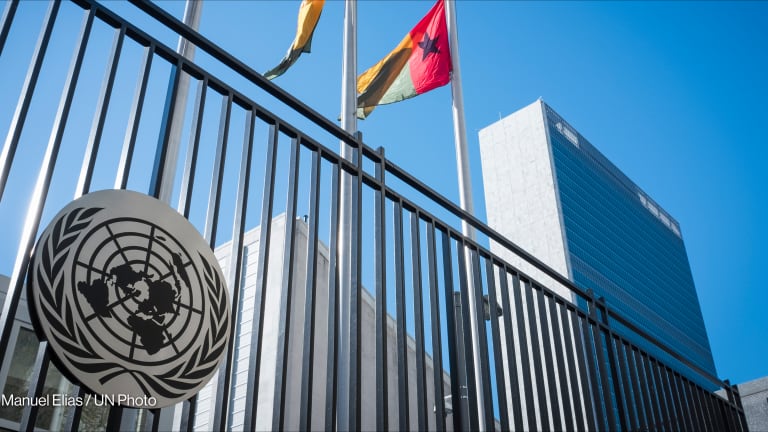
The Biden administration has recommended that Cindy McCain, the U.S. ambassador to United Nations agencies for food and agriculture, replace David Beasley as head of the World Food Programme when his tenure as leader of the global food champion concludes in April, several U.N.-based diplomats and food experts told Devex.
McCain, the widow of the late Republican Senator John McCain, is one of two candidates the United States has formally recommended the U.N. appoint for a five-year term as executive director of the Rome-based food agency. But one U.N. official familiar with the job search said the U.S. has made it clear it favors McCain.
The other candidate is David Lane, former U.S. ambassador to the U.N. food agencies during the Obama administration, and current president of the Annenberg Foundation Trust at Sunnylands. He previously served as chief executive of the ONE Campaign, a global advocacy group that tackles extreme poverty and as the director of advocacy for the Bill & Melinda Gates Foundation.
The revelation comes just days before WFP’s executive board, which is made up of representatives of 36 member states, meets in Rome next week. One diplomat familiar with the recruitment process told Devex that U.N. Secretary-General António Guterres, who will make the final call, may take advantage of the meeting to disclose his choice.
A State Department spokesperson declined to comment on whether it offered any recommendations, noting in an email that “we respect the appointment process and ask that you pose any related questions to the office of the U.N. secretary-general.”
“The World Food Program plays a crucial role at the center of the international community’s efforts to respond to the worsening global food security crisis and, as its largest contributor, the United States is deeply invested in its continuing success,” the spokesperson added.
Stéphane Dujarric, spokesperson for Guterres, declined to comment. Efforts to reach McCain through the U.S. embassy in Rome or Lane at the Annenberg Foundation Trust on Thursday were unsuccessful.
A WFP spokesperson told Devex by email that Beasley was asked earlier this year to extend his term for an additional year in response “to the unprecedented global hunger crisis, sparked by a perfect storm of conflict, climate change, COVID-19, and now exacerbated by the war in Ukraine. His term of office will end in April 2023 and the process to appoint his successor has begun."
The U.S. initially passed last year on an opportunity to replace Beasley, a former South Carolina governor who was promoted for the job by President Donald Trump’s then U.N. Ambassador, Nikki Haley. The delay provided McCain — who was confirmed as U.S. ambassador to the U.N. food agencies in late October, 2021, about six months before the WFP job was to become available — with an opportunity to build up her résumé on international food issues.
McCain has been at the forefront of U.S. efforts to rally the international community to provide greater resources to head off a major global food crisis, which has been exacerbated by Russia’s invasion of Ukraine. But she and other U.S. officials had initially expressed skepticism that a landmark U.N.-brokered grain deal could help unleash millions of tons of Ukrainian grain through the Black Sea.
“I am not optimistic,” she told Devex back in July, a week before the deal was concluded. “I obviously have great faith in our leaders, so if anyone can do it, they can.”
“I hope and pray that this works,” she added.
In the end, the Black Sea grain deal proved surprisingly effective, permitting Ukraine to export tens of millions of tons of wheat and other grains.
The World Food Programme and its 22,000 staff members provide food and assistance to some 128 million of the world’s neediest people in more than 120 countries, including conflict zones such as Ukraine and Yemen, and drought-afflicted nations from Somalia to South Sudan.
The top U.N food post has been held by a U.S. national since the early 1990s, when Catherine Bertini succeeded the Australian chief of the U.N. agency, James Ingram. The recent U.S. monopoly on the post reflects the nation’s role as the largest financial contributor to the food agency, which raised $9.6 billion in voluntary funds in 2021. The U.S. has already contributed more than $5.3 billion to the World Food Programme in 2022.
The appointment is officially decided jointly by the U.N. secretary-general and the director general of the Food and Agricultural Organization of the United Nations, which is currently headed by a former Chinese government agriculture minister, Qu Dongyu. But in reality, the appointment is typically the result of behind-the-scenes negotiations between the U.S. and the U.N. chief.








